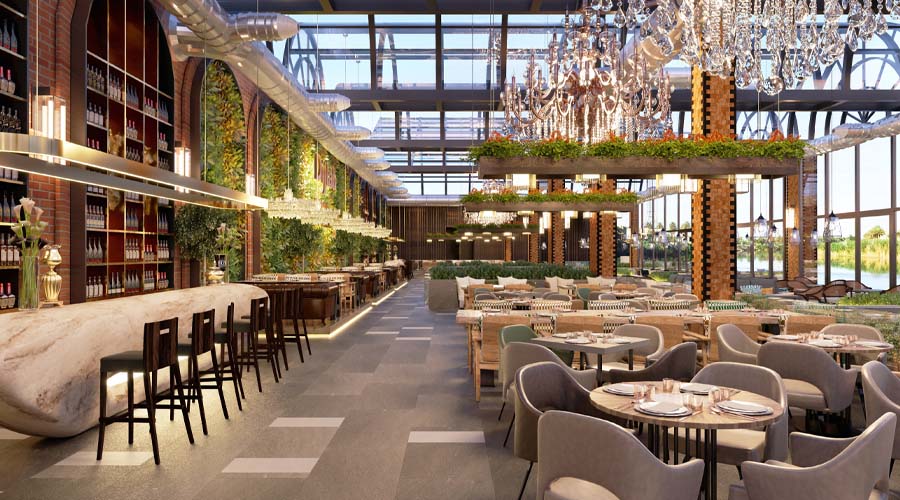Kanika Dabra graduated from our MBA program in 2021 and today she is working with London-based Music Brand Communication (MBC), which curates artisanal playlists for luxury brands. Here she offers her thoughts on why music curation can be a vital element of luxury hospitality experiences.
Most successful luxury hotel brands have two things in common. One, they are more than ‘just’ a hotel; and two, all their design strategies are meticulously considered.

“Music design has become a vital component for luxury brands that wish to be distinctive.”
Take the Aman group as an example. From the locations of the properties to the hotel design, and even the music they play in their venues – all these elements are carefully chosen and this is what makes the brand stand out.
For the past couple of years, music design has become a vital component for luxury brands that wish to be distinctive, engage with their guests, create a desirable environment and uphold their luxury status.
The researchers of Consumer Neuroscience have hypothesized that human decision-making is influenced by various sensory stimuli and that music is a vital tool that has the ability to create and shape how consumer feels and what decisions they make. Hence, the kind of music you play has become incredibly important as it affects how the guests engage and what they experience in your outlets.
Just like the revenue management definition: ‘Selling the right product, to the right customer, the right price, right channel, right time’ became the holy grail for an establishment’s success; so choosing the right music to be played at the right time, can also prove to boost profits and build your brand identity.
Music and the guest experience
Music is a direct and cost effective way of establishing mood and building rapport with your target market. The right soundtrack can ‘speak the language’ of your customer base; resonating with their values, tastes, and aspirations. Research conducted by Marketing Charts, a hub of marketing data, graphics, and analyses, claims that 81% of consumers say that background music helps create a better atmosphere and lifts their mood, while 30% believe that they would be more likely to buy a product or service when the music they like is played.
In hospitality, playing the right type of music can increase your sales revenue. Reflect back to the last time you were sat in a bar with a large group of friends. Think about the ambiance, the music, the warmth, and energy exuding from the various intertwined sounds. Something which can’t be replicated, right? Now envision sitting in the same bar with no background music. It would be a vastly different experience, perhaps less inviting for you to extend your time there with another cocktail or two. Gone is the opportunity to maximize sales with guests already in your establishment there and then!
In a landmark study from 1982, the academic Ronald E. Milliman proved how playing slower music reduced the speed at which customers moved through a store. But the most interesting takeaway? He also noted that this change in customer behavior led to a 38% sales increase.
Stephane Malca is the CEO and Founder of Music Brand Communication (MBC), the company I now work for. He says, “Music is such a simple and beautiful way to improve the guest experience if done with care and sensitivity. Perfectly curated playlists allow your brand to connect and engage directly with guests on a far deeper & emotional level. it is an essential element of branding today and must be given the attention and thought it deserves.”
A positive guest experience also equals a returning (loyal) guest. Music can create memories that are connected to a particular setting and often linked to specific emotions. The right soundtrack can speak the language of your customer base; resonating with their values, tastes, and aspirations. It can increase a person’s sense of belonging to a brand, plus their likelihood of returning. Hence, guests that have had a positive experience in a venue are more likely to come back, whereas guests that have a negative experience tend to never come back and could even leave negative feedback.
My colleague Emily Chard is MBC’s Head of Library and Music Services. She notes, “It’s absurd that so many establishments seem to forget that as humans we have five senses and that, for a great guest experience, there needs to be harmony between all of them. Whether it’s clashing décor, an uncomfortable ambient temperature, a funny smell, or incongruous music, just one element out of order can completely ruin the experience.”
Music and brand identity
Not only does music impact a guest’s experience; but it also underscores your brand’s identity. In a recent article, I noted how companies like Coca-Cola and Tiffany have full legal rights over their icon hues and colors. This is because color increases brand recognition by 80%. Just like color recognition, consumers have also associated certain tunes and even certain playlists with specific brands. It means consistency is key when it comes to creating playlists for a specific brand. By this, I mean creating music around the environment and the overall feeling of a brand. This provides brands with a competitive edge.
“Music can be utilized as a great tool of customer engagement; nudging people to make both emotional and transactional investments in your brand. It has the power to create magical moments and memories for guests, generating repeat custom and brand loyalty,” says Philippa Day, Business Development Director at MBC.
Music and employee productivity
Last, but definitely not least, music also influences your employee’s productivity. While customers are what drives a business, employees, in my opinion, hold equal importance. A recent MusicWorks study found that a whopping 81% of staff performed better when listening to music. The cause for this productivity boost, according to additional studies, is attributed to the mood-enhancing properties of music. This explains why 74% of employees who like music enjoy going to work when good music is played. And why 75% of business owners believe allowing staff to listen to music helps with team bonding.
Hence, with this in mind, it is imperative to remember your staff when it comes to considering the impact of background music in your venue, since it affects their mood, morale, and productivity, too. In addition, the right type of music also needs to be played at the right time. For example, rap and heavy metal wouldn’t work in a hotel’s lounge during afternoon tea where staff would struggle to speak to the guests!
All in all, music design, just like visual and olfactory design, should be a vital part of a luxury hospitality marketing strategy as it enhances your guest’s experience, is a cost-effective way to increase your company’s sales and revenue, and also plays a vital role in increasing employee morale and productivity. Hence, it has become an impactful resource for those who wish to be distinctive, engage with their guests, create a desired environment, and uphold their luxury status.
I’ll leave the last word to Philippa Day, our Business Development Director.
“Today the seasoned traveler expects far more from their hotel stay than simply a place to sleep; that’s why it’s crucial to elevate the guest experience and create experiential stays. On-brand music curation is the perfect means to do this.”
Sources and further reading:
Cain-Smith and Curnow demonstrated how music volume could affect traffic through a shopping center.
Caldwell and Hibbert connected a slow tempo to increased dwell time and drink purchases. Knöferle revealed how minor musical keys could drive additional spending in some contexts. HUI Research found that brand-matched music in the food and beverage sector could boost sales by 9%.
A Texan study found certain genres could trigger more expensive purchasing decisions.




